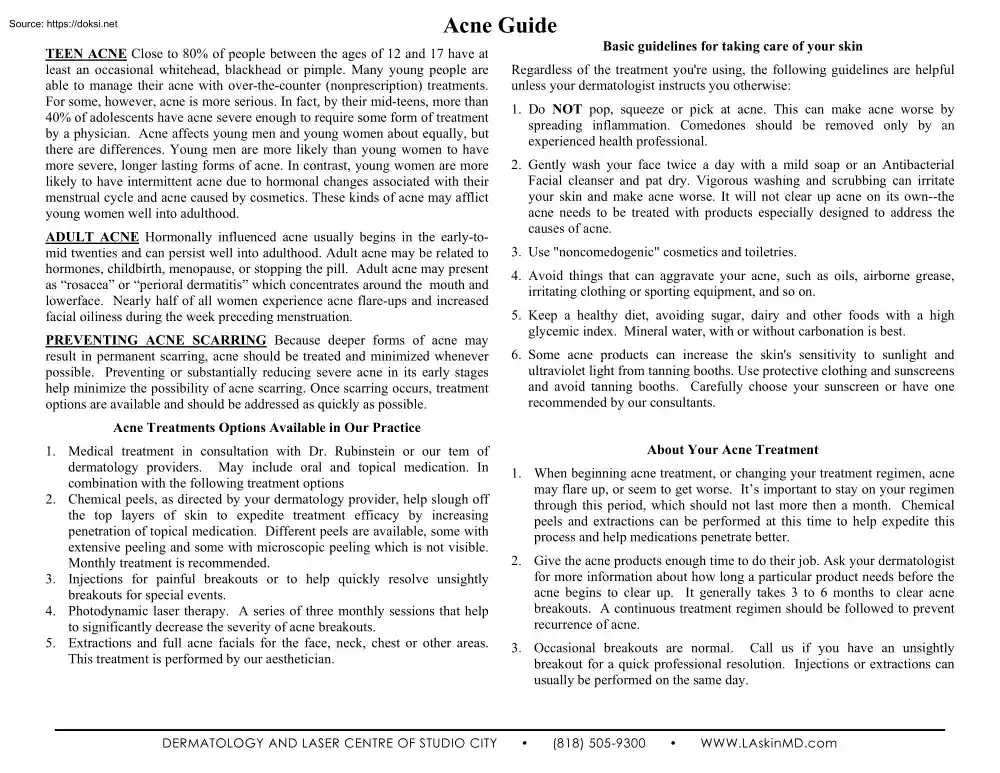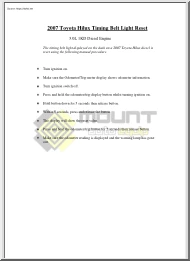A doksi online olvasásához kérlek jelentkezz be!

A doksi online olvasásához kérlek jelentkezz be!
Nincs még értékelés. Legyél Te az első!
Mit olvastak a többiek, ha ezzel végeztek?
Tartalmi kivonat
Acne Guide TEEN ACNE Close to 80% of people between the ages of 12 and 17 have at least an occasional whitehead, blackhead or pimple. Many young people are able to manage their acne with over-the-counter (nonprescription) treatments. For some, however, acne is more serious. In fact, by their mid-teens, more than 40% of adolescents have acne severe enough to require some form of treatment by a physician. Acne affects young men and young women about equally, but there are differences. Young men are more likely than young women to have more severe, longer lasting forms of acne. In contrast, young women are more likely to have intermittent acne due to hormonal changes associated with their menstrual cycle and acne caused by cosmetics. These kinds of acne may afflict young women well into adulthood. ADULT ACNE Hormonally influenced acne usually begins in the early-tomid twenties and can persist well into adulthood. Adult acne may be related to hormones, childbirth, menopause, or stopping
the pill. Adult acne may present as “rosacea” or “perioral dermatitis” which concentrates around the mouth and lowerface. Nearly half of all women experience acne flare-ups and increased facial oiliness during the week preceding menstruation. PREVENTING ACNE SCARRING Because deeper forms of acne may result in permanent scarring, acne should be treated and minimized whenever possible. Preventing or substantially reducing severe acne in its early stages help minimize the possibility of acne scarring. Once scarring occurs, treatment options are available and should be addressed as quickly as possible. Basic guidelines for taking care of your skin Regardless of the treatment you're using, the following guidelines are helpful unless your dermatologist instructs you otherwise: 1. Do NOT pop, squeeze or pick at acne This can make acne worse by spreading inflammation. Comedones should be removed only by an experienced health professional. 2. Gently wash your face twice a day
with a mild soap or an Antibacterial Facial cleanser and pat dry. Vigorous washing and scrubbing can irritate your skin and make acne worse. It will not clear up acne on its own--the acne needs to be treated with products especially designed to address the causes of acne. 3. Use "noncomedogenic" cosmetics and toiletries 4. Avoid things that can aggravate your acne, such as oils, airborne grease, irritating clothing or sporting equipment, and so on. 5. Keep a healthy diet, avoiding sugar, dairy and other foods with a high glycemic index. Mineral water, with or without carbonation is best 6. Some acne products can increase the skin's sensitivity to sunlight and ultraviolet light from tanning booths. Use protective clothing and sunscreens and avoid tanning booths. Carefully choose your sunscreen or have one recommended by our consultants. Acne Treatments Options Available in Our Practice 1. Medical treatment in consultation with Dr Rubinstein or our tem of dermatology
providers. May include oral and topical medication In combination with the following treatment options 2. Chemical peels, as directed by your dermatology provider, help slough off the top layers of skin to expedite treatment efficacy by increasing penetration of topical medication. Different peels are available, some with extensive peeling and some with microscopic peeling which is not visible. Monthly treatment is recommended. 3. Injections for painful breakouts or to help quickly resolve unsightly breakouts for special events. 4. Photodynamic laser therapy A series of three monthly sessions that help to significantly decrease the severity of acne breakouts. 5. Extractions and full acne facials for the face, neck, chest or other areas This treatment is performed by our aesthetician. DERMATOLOGY AND LASER CENTRE OF STUDIO CITY About Your Acne Treatment 1. When beginning acne treatment, or changing your treatment regimen, acne may flare up, or seem to get worse. It’s important to
stay on your regimen through this period, which should not last more then a month. Chemical peels and extractions can be performed at this time to help expedite this process and help medications penetrate better. 2. Give the acne products enough time to do their job Ask your dermatologist for more information about how long a particular product needs before the acne begins to clear up. It generally takes 3 to 6 months to clear acne breakouts. A continuous treatment regimen should be followed to prevent recurrence of acne. 3. Occasional breakouts are normal Call us if you have an unsightly breakout for a quick professional resolution. Injections or extractions can usually be performed on the same day. (818) 505-9300 WWW.LAskinMDcom
the pill. Adult acne may present as “rosacea” or “perioral dermatitis” which concentrates around the mouth and lowerface. Nearly half of all women experience acne flare-ups and increased facial oiliness during the week preceding menstruation. PREVENTING ACNE SCARRING Because deeper forms of acne may result in permanent scarring, acne should be treated and minimized whenever possible. Preventing or substantially reducing severe acne in its early stages help minimize the possibility of acne scarring. Once scarring occurs, treatment options are available and should be addressed as quickly as possible. Basic guidelines for taking care of your skin Regardless of the treatment you're using, the following guidelines are helpful unless your dermatologist instructs you otherwise: 1. Do NOT pop, squeeze or pick at acne This can make acne worse by spreading inflammation. Comedones should be removed only by an experienced health professional. 2. Gently wash your face twice a day
with a mild soap or an Antibacterial Facial cleanser and pat dry. Vigorous washing and scrubbing can irritate your skin and make acne worse. It will not clear up acne on its own--the acne needs to be treated with products especially designed to address the causes of acne. 3. Use "noncomedogenic" cosmetics and toiletries 4. Avoid things that can aggravate your acne, such as oils, airborne grease, irritating clothing or sporting equipment, and so on. 5. Keep a healthy diet, avoiding sugar, dairy and other foods with a high glycemic index. Mineral water, with or without carbonation is best 6. Some acne products can increase the skin's sensitivity to sunlight and ultraviolet light from tanning booths. Use protective clothing and sunscreens and avoid tanning booths. Carefully choose your sunscreen or have one recommended by our consultants. Acne Treatments Options Available in Our Practice 1. Medical treatment in consultation with Dr Rubinstein or our tem of dermatology
providers. May include oral and topical medication In combination with the following treatment options 2. Chemical peels, as directed by your dermatology provider, help slough off the top layers of skin to expedite treatment efficacy by increasing penetration of topical medication. Different peels are available, some with extensive peeling and some with microscopic peeling which is not visible. Monthly treatment is recommended. 3. Injections for painful breakouts or to help quickly resolve unsightly breakouts for special events. 4. Photodynamic laser therapy A series of three monthly sessions that help to significantly decrease the severity of acne breakouts. 5. Extractions and full acne facials for the face, neck, chest or other areas This treatment is performed by our aesthetician. DERMATOLOGY AND LASER CENTRE OF STUDIO CITY About Your Acne Treatment 1. When beginning acne treatment, or changing your treatment regimen, acne may flare up, or seem to get worse. It’s important to
stay on your regimen through this period, which should not last more then a month. Chemical peels and extractions can be performed at this time to help expedite this process and help medications penetrate better. 2. Give the acne products enough time to do their job Ask your dermatologist for more information about how long a particular product needs before the acne begins to clear up. It generally takes 3 to 6 months to clear acne breakouts. A continuous treatment regimen should be followed to prevent recurrence of acne. 3. Occasional breakouts are normal Call us if you have an unsightly breakout for a quick professional resolution. Injections or extractions can usually be performed on the same day. (818) 505-9300 WWW.LAskinMDcom




